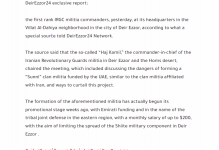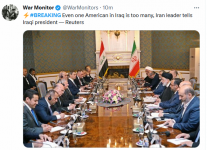You are using an out of date browser. It may not display this or other websites correctly.
You should upgrade or use an alternative browser.
You should upgrade or use an alternative browser.
WAR Main Persian Gulf Trouble thread
- Thread starter northern watch
- Start date
jward
passin' thru
Iran International English
@IranIntl_En
3h
Iran’s Revolutionary Guard Corps claims it has developed its latest suicide drone named Meraj 532 with a one-way range of 450km.
"The easy-setup drone can fly up to a height of 12,000 feet for 3 hours after taking off from a vehicle. With its 50 kg warhead, it has high accuracy."
View: https://twitter.com/IranIntl_En/status/1645137289536831491?s=20
@IranIntl_En
3h
Iran’s Revolutionary Guard Corps claims it has developed its latest suicide drone named Meraj 532 with a one-way range of 450km.
"The easy-setup drone can fly up to a height of 12,000 feet for 3 hours after taking off from a vehicle. With its 50 kg warhead, it has high accuracy."
View: https://twitter.com/IranIntl_En/status/1645137289536831491?s=20
jward
passin' thru
Hezbollah, Hamas heads meet, promise further 'resistance' against Israel
By JERUSALEM POST STAFF, YONAH JEREMY BOB
5–6 minutes
Hamas leader Ismail Haniyeh met in Beirut with Hezbollah chief Hassan Nasrallah to discuss resistance efforts against Israel, after a tense weekend in which his terror group fired rockets across the country’s southern and northern borders.
Haniyeh’s deputy Saleh al-Arouri was also present at the meeting, which was reported on by the affiliated news outlet Al-Mayadeen.
In Israel, the IDF continued to reinforce itself with additional reserve forces, which was itself a response to several days of rocket attacks from Gaza, then Lebanon and then Syria, as well as multiple terror incidents and tension surrounding the Temple Mount at the height of Passover and Ramadan.
The IDF last week had already called up unspecified numbers of reservist Border Police officers, and air defense and air force attack personnel. On Saturday, it was announced that there would be reinforcements of police in Tel Aviv following a car-ramming attack there.
IRAN’S PRESIDENT Ebrahim Raisi meets with Syrian President Bashar Assad in Tehran, earlier this month. (credit: OFFICIAL PRESIDENTIAL WEBSITE / REUTERS)"The crimes of the Zionist regime are a sign of weakness and are proof of a bright and promising future for the resistance movement."
Iranian President Ebrahim Raisi
Then on Sunday, the IDF and Israel Police announced that they were calling up an additional four companies of reservists, after having called up six companies in recent weeks.
All of this came after the IDF called up multiple additional battalions (larger than companies) in recent weeks to handle security issues in Huwara and other West Bank hot spots.
Al Mayadeen reported that Nasrallah and Haniyeh discussed further coordination of “resistance” efforts.
The IDF has also sent clear signals that it views Iran, Syria and Hezbollah as being responsible for the overall threat picture, even as it accused Hamas or Palestinian groups affiliated with it of actually firing the rockets.
In its responses to rocket fire, the IDF struck not only Hamas positions in Lebanon and Gaza, but also Iranian ones in Syria, as well as some affiliated with the regime of Syrian President Bashar Assad.
There was speculation that the IDF was trying to get Assad to restrain Iran and get Tehran to restrain the groups that fired on Israel, or face further IDF retaliation.
There have been no new rockets fired on any front since the IDF’s latest airstrikes against Syria on Sunday morning.
Iranian, Syrian presidents talk "resistance" against Israel
Also on Sunday, Assad and Iranian President Ebrahim Raisi discussed Ramadan and “resistance” efforts against Israel. According to Iranian state media outlets, Raisi told Assad that “the crimes of the Zionist regime are a sign of weakness and are proof of a bright and promising future for the resistance movement.”Raisi further claimed the world was changing and that support was now growing for the “axis of the resistance” against Israel, according to the Iranian Students’ News Agency.
As of press time, Sunday had been the quietest day in terms of new violence in several days.
Ongoing Israeli-Palestinian clashes amid Passover, Ramadan
Although there were confrontations between Palestinians and the Israel Police, they were muted compared to last week. On Wednesday, police stormed al-Aqsa Mosque in order to ferret out Palestinians who tried to barricade themselves inside overnight in violation of a curfew agreed upon with the Wakf Islamic religious trust, through which Jordan administers the Muslim holy sites.In that incident, police fired stun grenades and removed the people inside; Palestinians in the mosque shot fireworks and threw stones at Israeli forces. Dozens of Palestinians were reportedly injured or arrested in those clashes.
Footage from the scene published by Palestinian media showed police officers hitting Palestinians in the mosque with chairs and batons and arresting many of them.
A few hours after last week’s clashes, 10 rockets were fired from the Gaza Strip toward southern Israel. That was followed by further rocket fire in the next two days from Gaza, Lebanon and later Syria.
Although 842 Jews ascended the Temple Mount on Sunday, a 43% increase in worshipers compared to last Passover, the larger numbers did not lead to more conflict.
In fact, over Saturday night and Sunday, the police did not have much direct conflict with Palestinians, despite some of them violating the curfew again.
There were also no new terror incidents on Sunday after multiple incidents on Friday in Tel Aviv and the Jordan Valley.
The rise in tensions in recent weeks between Israelis, Palestinians and neighboring countries comes amid the coinciding holidays of the week of Passover and the month of Ramadan, both of which see worshipers flock to Jerusalem’s holy sites.
Tovah Lazaroff and Tzvi Joffre contributed to this report.
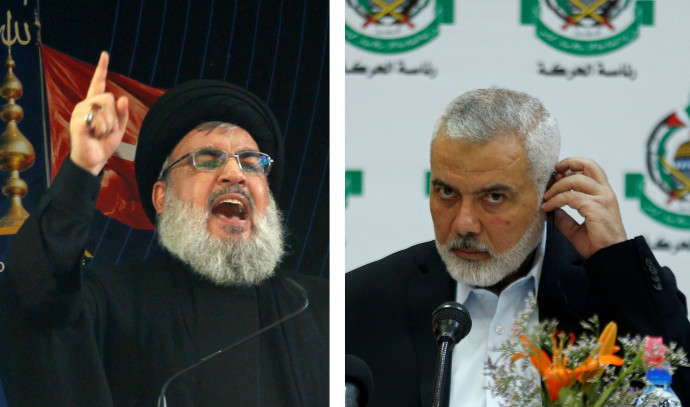
Hezbollah, Hamas heads meet, promise further 'resistance' against Israel
Ebrahim Raisi: "The crimes of the Zionist regime are a sign of weakness and are proof of a bright and promising future for the resistance movement."
jward
passin' thru
Iran International English
@IranIntl_En
2m
Schools in several cities of Iran witnessed suspicious chemical attacks once again on Tuesday, with poisoned students transferred to medical centers.
This comes as Culture Ministry has sent a notice to local media to censor the news related to the attacks.

 iranintl.com
View: https://twitter.com/IranIntl_En/status/1645851818746957834?s=20
iranintl.com
View: https://twitter.com/IranIntl_En/status/1645851818746957834?s=20
@IranIntl_En
2m
Schools in several cities of Iran witnessed suspicious chemical attacks once again on Tuesday, with poisoned students transferred to medical centers.
This comes as Culture Ministry has sent a notice to local media to censor the news related to the attacks.

Poisoning At Iran Schools Unabated; Regime Urges Media Not To Cover News
Schools in several cities of Iran witnessed suspicious chemical attacks once again on Tuesday, with poisoned students transferred to medical centers.
jward
passin' thru
Iran in secret talks with China, Russia to acquire sanctioned missile fuel
Matthew Karnitschnig
China and Russia are in advanced secret talks with Iran to replenish the Islamic Republic’s supply of a key chemical compound used to propel ballistic missiles, diplomats familiar with the matter say, a move that would mark a clear violation of United Nations sanctions and possibly help Moscow replenish its depleted stock of rockets.
Tehran has held concurrent negotiations with officials and government-controlled entities from both countries, including the state-owned Russian chemical maker FKP Anozit, to acquire large amounts of ammonium perchlorate, or AP, the main ingredient in solid propellants used to power missiles, said the diplomats, who requested anonymity in order to discuss confidential information.
In Beijing, Iranian diplomat Sajjad Ahadzadeh, who serves as Tehran’s “technology counselor” in China and the broader region has led the talks to acquire AP, according to the diplomats familiar with the matter. The diplomats said they didn’t know which Chinese companies were involved, however.
The exact quantity of AP Iran is seeking to purchase isn’t clear, but the diplomats familiar with its plans estimate it would be sufficient to build thousands of rockets, including the Zolfaghar missile, which has a range of 700 kilometers and has been used by both Iran and its proxies in the Middle East in recent years. If the deal goes through, some of those rockets could end up being deployed against Ukraine, the diplomats said.
Iran has supplied Russia with so-called kamikaze drones that it has used to attack Ukrainian civilian targets and has also advised Moscow on how to circumvent the international sanctions it faces as a result of its actions.
Representatives for China, Russia and Iran did not respond to requests for comment. Iran’s foreign ministry referred questions regarding Ahadzadeh to the Iranian embassy in Germany, which did not respond. The Iranian embassy in China also did not respond to questions about the diplomat’s activities or make him available for an interview.
The person who answered the phone at FKP Anozit asked for questions to be sent by email. The email bounced. The same person hung up when POLITICO called back seeking to put questions to the company. FKP Anozit does not appear to have a substantial presence as a business, even though the abbreviation FKP in its name means “Federal State Company” in Russian. Its homepage refers inquiries to an industrial marketplace called Techmika.
A search of Google Maps for its head office address in the remote Siberian town of Kuybyshev produced a Street View image of a redbrick house on a muddy street on which there was also a shoe shop, a driving school, and a car parts outlet. On the other side of the road stood an unfinished commercial building.
Fueling the war
The talks about procuring AP follow a warming of relations between Iran, Russia and China — which see themselves as a bulwark against U.S. influence — in the wake of Moscow’s all-out war against Ukraine.
Chinese President Xi Jinping, who visited Moscow last month, has stopped short of openly endorsing Russian President Vladimir Putin’s war in Ukraine but has left little doubt that Beijing’s allegiances ultimately rest with Russia. China, which recently presented a peace plan that critics say would force Ukraine to cede territory occupied by Russia, wants to make sure the Kremlin doesn’t lose the war, amid fears that could trigger the collapse of its neighbor and wider destabilization.
Both the U.S. and Europe have repeatedly cautioned Beijing against offering Russia military support, though it’s far from clear what consequences, if any, there would be if China were to ignore those warnings.
While China has supplied Russia with some military gear in recent months, the support has so far been modest, in part, analysts say, because Beijing is wary of angering its most important trading partners, the U.S. and Europe.
F-35 fighter jets and four U.S. Air Force F-16 fighter jets | South Korean Defense Ministry via Getty Images
Helping Russia via Iran by supplying the latter with AP, the diplomats familiar with the matter say, is one way China could offer Moscow substantial support behind the scenes. That China may be considering flouting U.N. sanctions it signed off on to help Russia’s war effort betrays deep concern in Beijing over its ally’s prospects, Western analysts said.
Under U.N. resolution 2231, passed in 2015, countries are prohibited from supplying Iran with AP without approval from the U.N. Security Council.
Ammonium perchlorate is a key component in solid-rocket fuel, which is often used for military use due to its reliability and long shelf life. Most of Iran’s precision-strike and short-range ballistic missiles rely on solid-fuel propellant motors. The country is also using the fuel to develop longer-range missiles under the guise of its space programs, analysts say.
“Iran is deepening its reliance on solid-propellant ballistic missiles in its security strategy,” said Behnam Ben Taleblu, a senior fellow Foundation for Defense of Democracies and the author of a recent comprehensive study on Iran’s missile program. “Therefore, the ingredients which go into solid-rocket fuel — like AP as an oxidizer — will only grow in importance for the regime.”
The suspected volume of the Russian and Chinese shipments “speaks to the imperative of possessing this material” for Iran, Ben Taleblu added.
Russia’s relentless attacks on Ukrainian targets over the past year have exhausted its supply of rockets. Though Russia produces its own missiles, its capacity to produce them lags the military’s appetite to fire them off. That’s why Iranian support, as with drones, could present an attractive alternative.
Like Russia, Iran is largely self-sufficient when it comes to producing missiles, but the international sanctions it faces in connection with its surreptitious nuclear weapons program have also limited its production capacity.
Iran is also keen to increase its own supply of ballistic missiles as it seeks to flex its muscles in the Middle East, analysts said. In 2020, Iran fired a dozen ballistic missiles at U.S. forces stationed at Ayn al-Asad Airbase in Iraq in retaliation for the assassination of General Qassem Soleimani, the leader of Iran’s paramilitary Quds force. The strike, which injured more than 100 U.S. servicemen, marked the largest such attack against American forces.
In November, the U.S. Navy discovered about 70 tons of AP, enough to fuel about a dozen medium-range rockets, on a ship in the Gulf of Oman en route from Iran to Yemen. U.S. officials believed the payload was intended for Yemen’s Iran-backed Houthi rebels, and the Navy sank the ship.
Douglas Busvine contributed reporting for this article.
Iran in secret talks with China, Russia to acquire sanctioned missile fuel
Matthew Karnitschnig
China and Russia are in advanced secret talks with Iran to replenish the Islamic Republic’s supply of a key chemical compound used to propel ballistic missiles, diplomats familiar with the matter say, a move that would mark a clear violation of United Nations sanctions and possibly help Moscow replenish its depleted stock of rockets.
Tehran has held concurrent negotiations with officials and government-controlled entities from both countries, including the state-owned Russian chemical maker FKP Anozit, to acquire large amounts of ammonium perchlorate, or AP, the main ingredient in solid propellants used to power missiles, said the diplomats, who requested anonymity in order to discuss confidential information.
In Beijing, Iranian diplomat Sajjad Ahadzadeh, who serves as Tehran’s “technology counselor” in China and the broader region has led the talks to acquire AP, according to the diplomats familiar with the matter. The diplomats said they didn’t know which Chinese companies were involved, however.
The exact quantity of AP Iran is seeking to purchase isn’t clear, but the diplomats familiar with its plans estimate it would be sufficient to build thousands of rockets, including the Zolfaghar missile, which has a range of 700 kilometers and has been used by both Iran and its proxies in the Middle East in recent years. If the deal goes through, some of those rockets could end up being deployed against Ukraine, the diplomats said.
Iran has supplied Russia with so-called kamikaze drones that it has used to attack Ukrainian civilian targets and has also advised Moscow on how to circumvent the international sanctions it faces as a result of its actions.
Representatives for China, Russia and Iran did not respond to requests for comment. Iran’s foreign ministry referred questions regarding Ahadzadeh to the Iranian embassy in Germany, which did not respond. The Iranian embassy in China also did not respond to questions about the diplomat’s activities or make him available for an interview.
The person who answered the phone at FKP Anozit asked for questions to be sent by email. The email bounced. The same person hung up when POLITICO called back seeking to put questions to the company. FKP Anozit does not appear to have a substantial presence as a business, even though the abbreviation FKP in its name means “Federal State Company” in Russian. Its homepage refers inquiries to an industrial marketplace called Techmika.
A search of Google Maps for its head office address in the remote Siberian town of Kuybyshev produced a Street View image of a redbrick house on a muddy street on which there was also a shoe shop, a driving school, and a car parts outlet. On the other side of the road stood an unfinished commercial building.
Fueling the war
The talks about procuring AP follow a warming of relations between Iran, Russia and China — which see themselves as a bulwark against U.S. influence — in the wake of Moscow’s all-out war against Ukraine.
Chinese President Xi Jinping, who visited Moscow last month, has stopped short of openly endorsing Russian President Vladimir Putin’s war in Ukraine but has left little doubt that Beijing’s allegiances ultimately rest with Russia. China, which recently presented a peace plan that critics say would force Ukraine to cede territory occupied by Russia, wants to make sure the Kremlin doesn’t lose the war, amid fears that could trigger the collapse of its neighbor and wider destabilization.
Both the U.S. and Europe have repeatedly cautioned Beijing against offering Russia military support, though it’s far from clear what consequences, if any, there would be if China were to ignore those warnings.
While China has supplied Russia with some military gear in recent months, the support has so far been modest, in part, analysts say, because Beijing is wary of angering its most important trading partners, the U.S. and Europe.
F-35 fighter jets and four U.S. Air Force F-16 fighter jets | South Korean Defense Ministry via Getty Images
Helping Russia via Iran by supplying the latter with AP, the diplomats familiar with the matter say, is one way China could offer Moscow substantial support behind the scenes. That China may be considering flouting U.N. sanctions it signed off on to help Russia’s war effort betrays deep concern in Beijing over its ally’s prospects, Western analysts said.
Under U.N. resolution 2231, passed in 2015, countries are prohibited from supplying Iran with AP without approval from the U.N. Security Council.
Ammonium perchlorate is a key component in solid-rocket fuel, which is often used for military use due to its reliability and long shelf life. Most of Iran’s precision-strike and short-range ballistic missiles rely on solid-fuel propellant motors. The country is also using the fuel to develop longer-range missiles under the guise of its space programs, analysts say.
“Iran is deepening its reliance on solid-propellant ballistic missiles in its security strategy,” said Behnam Ben Taleblu, a senior fellow Foundation for Defense of Democracies and the author of a recent comprehensive study on Iran’s missile program. “Therefore, the ingredients which go into solid-rocket fuel — like AP as an oxidizer — will only grow in importance for the regime.”
The suspected volume of the Russian and Chinese shipments “speaks to the imperative of possessing this material” for Iran, Ben Taleblu added.
Russia’s relentless attacks on Ukrainian targets over the past year have exhausted its supply of rockets. Though Russia produces its own missiles, its capacity to produce them lags the military’s appetite to fire them off. That’s why Iranian support, as with drones, could present an attractive alternative.
Like Russia, Iran is largely self-sufficient when it comes to producing missiles, but the international sanctions it faces in connection with its surreptitious nuclear weapons program have also limited its production capacity.
Iran is also keen to increase its own supply of ballistic missiles as it seeks to flex its muscles in the Middle East, analysts said. In 2020, Iran fired a dozen ballistic missiles at U.S. forces stationed at Ayn al-Asad Airbase in Iraq in retaliation for the assassination of General Qassem Soleimani, the leader of Iran’s paramilitary Quds force. The strike, which injured more than 100 U.S. servicemen, marked the largest such attack against American forces.
In November, the U.S. Navy discovered about 70 tons of AP, enough to fuel about a dozen medium-range rockets, on a ship in the Gulf of Oman en route from Iran to Yemen. U.S. officials believed the payload was intended for Yemen’s Iran-backed Houthi rebels, and the Navy sank the ship.
Douglas Busvine contributed reporting for this article.
Iran in secret talks with China, Russia to acquire sanctioned missile fuel
jward
passin' thru
FJ
@Natsecjeff
13m
Iranians refuse to step on the American flag at a local university in Iran. They refuse to buy the mullah regime's propaganda. This civil disobedience is what scares the mullahs.
View: https://twitter.com/Natsecjeff/status/1648745358259011584?s=20
@Natsecjeff
13m
Iranians refuse to step on the American flag at a local university in Iran. They refuse to buy the mullah regime's propaganda. This civil disobedience is what scares the mullahs.
View: https://twitter.com/Natsecjeff/status/1648745358259011584?s=20
jward
passin' thru

At least 78 people killed in Yemen stampede
2 minute readApril 19, 202310:15 PM CDTLast Updated a min ago
~3 minutes
April 20 (Reuters) - At least 78 people were killed in a stampede in the Yemeni capital Sanaa as hundreds gathered in a school to receive aid, witnesses and Houthi media said on Thursday.
Several people were injured including 13 who were in critical conditions, Al Masirah TV television news outlet run by the Iran-aligned Houthi movement reported, citing the director of health in Sanaa.
The stampede took place during the distribution of charitable donations by merchants in the final days of the Muslim holy month of Ramadan, the Houthi-controlled Ministry of Interior's spokesperson said in a statement.
Hundreds of people had crowded into a school to receive the donations, which amounted to 5,000 Yemeni riyals, or about $9 per person, two witnesses involved in the rescue effort told Reuters.
A video posted by Houthi television on Telegram messaging app showed a crowd of people jamed together, some screaming and shouting and reaching out to be pulled to safety.
The interior ministry also said in a separate statement that the two merchants responsible for organising the donation event had been detained and an investigation was underway.
Yemen has been embroiled in an eight-year civil war which has killed tens of thousands of people, wrecked the economy and pushed millions into hunger.
A Saudi-led coalition intervened in Yemen in 2015 after the Houthis ousted the government from the capital Sanaa in 2014. The conflict has widely been seen as a proxy war between Saudi Arabia and Iran.
Mohamed Ali al-Houthi, head of the Houthi supreme revolutionary committee, said the stampede was the result of the Yemeni people suffering "the worst global humanitarian crisis" after eight years of fighting.
"We hold the countries of aggression responsible for what happened and for the bitter reality that the Yemeni people live in because of the aggression and blockade," he said on Twitter.
Riyadh and Tehran in March agreed to restore diplomatic ties severed in 2016 and prisoner exchanges this month between the two sides have raised hopes of a resolution to the conflict.
The top negotiator of Yemen's Houthi movement said recent peace talks with Saudi Arabia had made progress and further discussions would be held to iron out remaining differences.
Reporting by Hatem Maher Editing by Chris Reese
/cloudfront-us-east-2.images.arcpublishing.com/reuters/IXLT7D2N3ZJRHMBIXH4SOJIG6U.jpg)
At least 78 people killed in Yemen stampede
Hundreds of people had crowded into a school to receive charitable donations by merchants, which amounted to 5,000 Yemeni riyals, or about $9 per person, two witnesses involved in the rescue effort told Reuters.
jward
passin' thru
Iran says its navy forced US submarine to surface in Gulf waters
Al Jazeera
A navy commander says a US submarine was forced to surface as it entered Iranian waters in the Strait of Hormuz.
An Iranian official says Iran’s navy obliged a US submarine to surface as it entered the Gulf “violating its border” in the latest report of an apparent confrontation between Iranian and US forces in the region.
“The US submarine was approaching while submerged, but the Iranian submarine Fateh detected it and carried out … manoeuvres to force it to surface as it went through the Strait [of Hormuz]. It had also entered into our territorial waters but … it corrected its course after being warned,” navy commander Shahram Irani told state television on Thursday.
“This submarine was doing its best, using all its capacities, to pass in total silence and without being detected,” Irani said. “We will certainly reflect to international bodies the fact that it had violated our border.”
Earlier this month, the US Navy said the nuclear-powered submarine Florida, equipped with a guided missile system, was operating in the Middle East in support of its Fifth Fleet based in Bahrain.
There was no immediate comment from the US military to Iran’s remarks.
In early April, the Iranian navy said it identified and warned off a US reconnaissance plane outside the mouth of the Gulf.
In 2021, US and Iranian warships had a tense encounter in the Gulf waters when a ship commanded by Iran’s Islamic Revolutionary Guard Corps (IRGC) cut in front of the USCGC Monomoy, causing the US Coast Guard vessel to come to an abrupt stop with its engine smoking.

Iran says its navy forced US submarine to surface in Gulf waters
A navy commander says a US submarine was forced to surface as it entered Iranian waters in the Strait of Hormuz.
jward
passin' thru
Heshmat Alavi
@HeshmatAlavi
7s
Regime agents in different cities of #Iran launched a new wave of deliberate and organized chemical attacks targeting schoolgirls. Dozens of students were poisoned.
Footage from Sanandaj, western Iran
View: https://twitter.com/HeshmatAlavi/status/1650556037282377754?s=20
@HeshmatAlavi
7s
Regime agents in different cities of #Iran launched a new wave of deliberate and organized chemical attacks targeting schoolgirls. Dozens of students were poisoned.
Footage from Sanandaj, western Iran
View: https://twitter.com/HeshmatAlavi/status/1650556037282377754?s=20
jward
passin' thru
Heshmat Alavi
@HeshmatAlavi
4h
Workers of over 80 industrial sites across #Iran are on strike, demanding better pay, decent food, and good housing/resting facilities.
Footage from Kerman, south-central Iran, and Kangan in eastern Iran
View: https://twitter.com/HeshmatAlavi/status/1650494198913589249?s=20
@HeshmatAlavi
4h
Workers of over 80 industrial sites across #Iran are on strike, demanding better pay, decent food, and good housing/resting facilities.
Footage from Kerman, south-central Iran, and Kangan in eastern Iran
View: https://twitter.com/HeshmatAlavi/status/1650494198913589249?s=20
jward
passin' thru
Heshmat Alavi
@HeshmatAlavi
11h
#Israel said to shell #Iran-backed Hezbollah position in southern #Syria
Syrian troops warned to stop cooperating with Tehran-supported terror group after reported artillery strikes in Quneitra area
Read more here
 View: https://twitter.com/HeshmatAlavi/status/1650381052752576517?s=20
View: https://twitter.com/HeshmatAlavi/status/1650381052752576517?s=20
@HeshmatAlavi
11h
#Israel said to shell #Iran-backed Hezbollah position in southern #Syria
Syrian troops warned to stop cooperating with Tehran-supported terror group after reported artillery strikes in Quneitra area
Read more here

danielboon
TB Fanatic
Faytuks News Δ
@Faytuks
·
Follow
US Navy says that a Marshall Islands-flagged oil tanker has been seized in the gulf of Oman by Iran's IRGC. The oil tanker issued distress call during the seizure.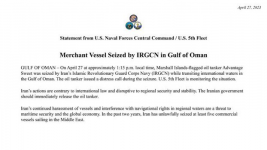
@Faytuks
·
Follow
US Navy says that a Marshall Islands-flagged oil tanker has been seized in the gulf of Oman by Iran's IRGC. The oil tanker issued distress call during the seizure.

danielboon
TB Fanatic
Moshe Schwartz
@YWNReporter
·
Follow
#BREAKING: US Navy Central Command says Iran's IRGC has seized the 'Advantage Sweet' oil tanker while it was transiting international waters in the Golf of Oman. The US 5th Fleet is monitoring the situation. The tanker was headed for the US. -Marine Traffic
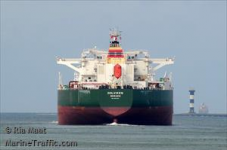
danielboon
TB Fanatic
Moshe Schwartz
@YWNReporter
·
Follow
#BREAKING: US Navy Central Command says Iran's IRGC has seized the 'Advantage Sweet' oil tanker while it was transiting international waters in the Golf of Oman. The US 5th Fleet is monitoring the situation. The tanker was headed for the US. -Marine Traffic View attachment 409911
Posted for fair use......
/cloudfront-us-east-2.images.arcpublishing.com/reuters/VYXGSNALTJKONC3O7BARHPLZ4E.jpg)
Iran seizes oil tanker in Gulf, U.S. Navy says
Iran seized a Marshall Islands-flagged oil tanker in the Gulf of Oman in international waters on Thursday, the U.S. Navy said, the latest in a series of seizures or attacks on commercial vessels in sensitive Gulf waters since 2019.
4 minute read April 27, 2023 2:50 PM PDT Last Updated 27 min ago
Iran seizes oil tanker in Gulf, U.S. Navy says
Reuters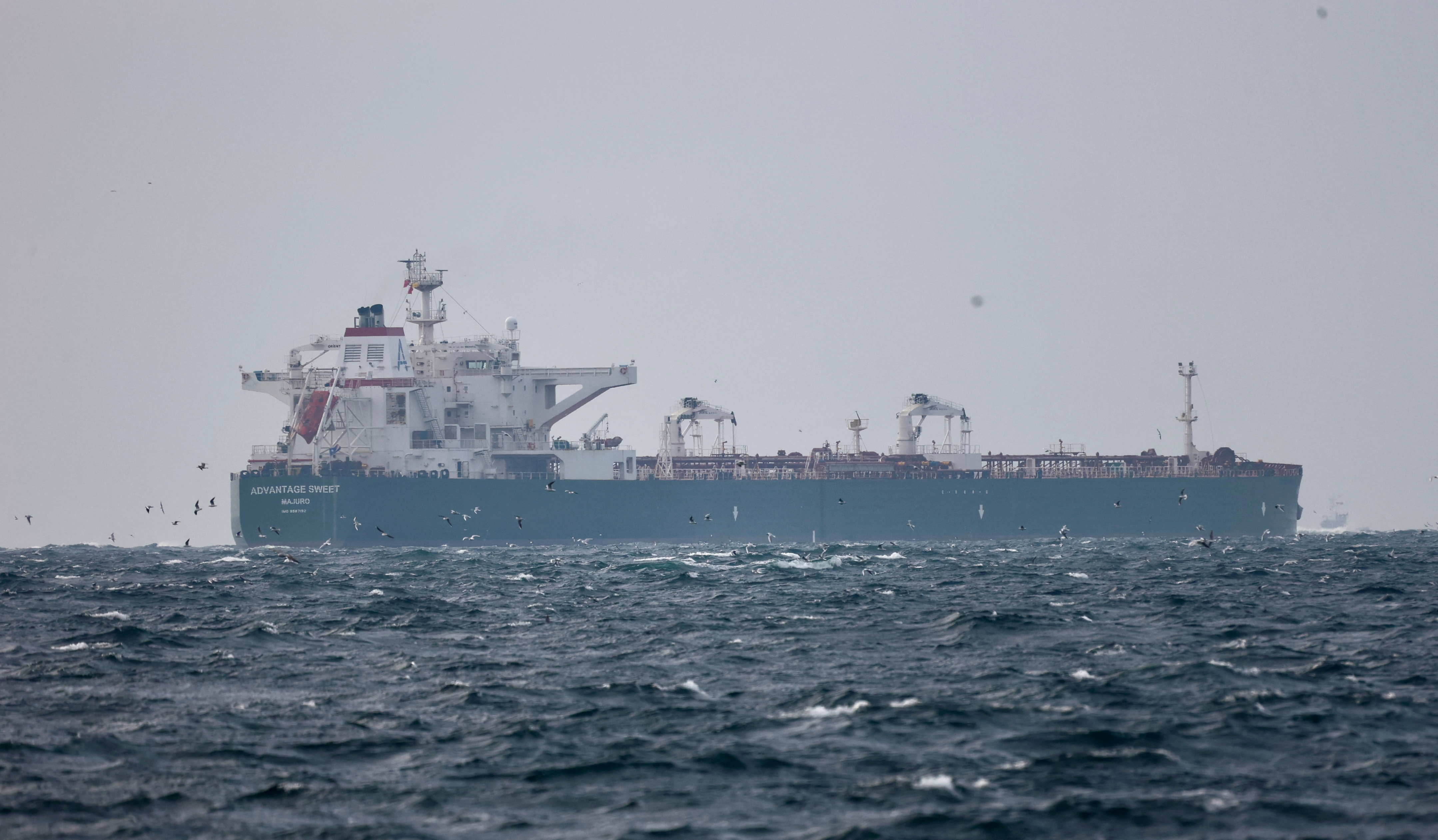
[1/4] Marshall Islands-flagged oil tanker Advantage Sweet, which, according to Refinitiv ship tracking data, is a Suezmax crude tanker which had been chartered by oil major Chevron and had last docked in Kuwait, sails at Marmara sea near Istanbul, Turkey January 10, 2023. REUTERS/Yoruk IsikRead Less
- Army says it seized tanker after it collided with Iranian boat
- U.S. Navy identifies tanker as Advantage Sweet
- Tanker had been headed for Houston - ship tracking data
- Tanker boarded by helicopter - maritime security company
Iran's army said it had seized a Marshall Islands-flagged oil tanker in the Gulf of Oman after it collided with an Iranian boat, injuring several crewmen, Iranian state media reported.
"Two members of the boat's crew are missing and several were injured due to the collision of the ship with the boat," an army statement said.
The U.S. Navy identified the vessel as the Advantage Sweet. According to Refinitiv ship tracking data, it is a Suezmax crude tanker that had been chartered by oil major Chevron (CVX.N) and had last docked in Kuwait.
Chevron said it is aware of the situation involving the Advantage Sweet.
"We are in contact with the vessel operator with the hope of resolving this situation as soon as possible," a spokesperson said.
The vessel's destination was listed as the U.S. Gulf of Mexico port of Houston, ship tracking data showed.
Its manager is listed as Genel Denizcilik Nakliyati AS. The Turkey-based company did not immediately respond to a request for comment.
The Marshall Islands Maritime Administrator said it was aware of the situation and was in communication with the vessel's owner/operator but declined to comment further.
"Iran's continued harassment of vessels and interference with navigational rights in regional waters are a threat to maritime security and the global economy," the U.S. Navy said, adding Iran has in the past two years unlawfully seized at least five commercial vessels in the Middle East.
The U.S. Navy added that after sending a P-8 Poseidon maritime patrol aircraft to monitor the situation, "we have since been able to determine the IRIN (Iranian navy) conducted the seizure".
Iranian authorities did not immediately respond to a Reuters request for comment.
About a fifth of the world's crude oil and oil products passes through the Strait of Hormuz, a narrow choke point between Iran and Oman which the Advantage Sweet had passed through, according to data from analytics firm Vortexa.
BOARDED VIA HELICOPTER
Maritime security company Ambrey said the vessel had been boarded via helicopter. "The vessel did not show any signs of conducting evasive manoeuvres prior to the incident," it said.Munro Anderson, with maritime security company Dryad, said separately that Iran usually detained vessels for "leverage or signalling".
“The working hypothesis at the moment is that it could either be an arbitrary detention of a vessel by Iran in response to the U.S. sailing its first unmanned vessel through the region last week - as a show of force," he said. "Or, it could be in response to the sanctions on the 24th (of April) by the U.S. against personnel in Iran connected to the IRGC (elite Revolutionary Guards)."
Since 2019 there have been a series of attacks on shipping in the strategic Gulf waters at times of tension between the United States and Iran.
Iran last November released two Greek-flagged tankers it seized in the Gulf in May in response to the confiscation of oil by the United States from an Iranian-flagged tanker off the Greek coast.
Indirect talks between Tehran and Washington to revive Iran's 2015 nuclear pact with world powers have stalled since September over a range of issues, including the Islamic Republic's violent crackdown on popular protests, Tehran's sale of drones to Russia and acceleration of its nuclear program.
The U.S. Navy, whose Fifth Fleet is based at the Gulf island state of Bahrain, called on Iran's Islamic Revolutionary Guards Corps Navy (IRGCN) to immediately release the tanker.
The ship issued a distress call during the seizure, the U.S. Navy statement said.
According to the International Maritime Organisation shipping database, the Advantage Sweet is owned by a China-registered company called SPDBFL No One Hundred & Eighty-Seven (Tianjin) Ship Leasing Co Ltd.
(This story has been refiled to remove an incorrect byline)
Reporting by Maria Ponnezhath in Bengaluru Editing by Bernadette Baum
jward
passin' thru
U.S. Central CommandAFP News Agency
@AFP
2h
#BREAKING Iran Guards seize oil tanker in Gulf of Oman: US Navy
AFP News Agency
@AFP
#BREAKING Two Iranian crew missing, several injured after Gulf oil tanker collision: Iran army
@CENTCOM
5h
Here is a statement from the CENTCOM commander on the the seizure of a merchant vessel in the Gulf of Oman.
View: https://twitter.com/CENTCOM/status/1651636072743571456?s=20
jward
passin' thru
Gabriel Noronha
@GLNoronha
2h
NEW: 6 Dem and 6 GOP Senators wrote to Biden asking why his administration is not funding the DHS program that seizes illegal Iranian oil and gas shipments.
That program had seized nearly $228M in oil linked to the IRGC since 2019. Treasury cut off funds to the program in FY22.
View: https://twitter.com/GLNoronha/status/1651687218572849167?s=20
@GLNoronha
2h
NEW: 6 Dem and 6 GOP Senators wrote to Biden asking why his administration is not funding the DHS program that seizes illegal Iranian oil and gas shipments.
That program had seized nearly $228M in oil linked to the IRGC since 2019. Treasury cut off funds to the program in FY22.
View: https://twitter.com/GLNoronha/status/1651687218572849167?s=20
Long over due.......
The Warthogs will get software updates enabling them to carry up to 16 Small Diameter Bombs...
jward
passin' thru
Iran International English
@IranIntl_En
7h
In a joint press conference with Iraqi president in Tehran, Iran’s President Raisi said "a security understanding has been established between the two countries,” apparently referring to the activities of Iraq-based dissident Kurdish groups that work against Iran’s regime.
@IranIntl_En
7h
In a joint press conference with Iraqi president in Tehran, Iran’s President Raisi said "a security understanding has been established between the two countries,” apparently referring to the activities of Iraq-based dissident Kurdish groups that work against Iran’s regime.
jward
passin' thru
Terror Alarm
@Terror_Alarm
14h
Japan, South Korea and Taiwan must join NATO before this happens.
View: https://twitter.com/Terror_Alarm/status/1652293288932638721?s=20
@Terror_Alarm
14h
Japan, South Korea and Taiwan must join NATO before this happens.
View: https://twitter.com/Terror_Alarm/status/1652293288932638721?s=20
Uh oh.......................
Terror Alarm
@Terror_Alarm
14h
Japan, South Korea and Taiwan must join NATO before this happens.
View: https://twitter.com/Terror_Alarm/status/1652293288932638721?s=20
Someone's asking to be made an example of and a JDAM fueled Linebacker Redux would be a very likely rendition of that, especially since the bunch inside the Beltway are looking for ways to look "Presidential" as well as for "distractions", well Merde............
mzkitty
I give up.
Uh oh.......................
Yup, that what I thought too.
jward
passin' thru
NRT English
@NRT_English
7m
As Kurdistan tensions rise, the PUK makes overtures to Baghdad, seeking a separate agreement to address key issues such as Sulaymaniyah's financial situation. This move could redefine power dynamics and challenge the region's existing political landscape.
View: https://twitter.com/NRT_English/status/1652754179536846856?s=20
@NRT_English
7m
As Kurdistan tensions rise, the PUK makes overtures to Baghdad, seeking a separate agreement to address key issues such as Sulaymaniyah's financial situation. This move could redefine power dynamics and challenge the region's existing political landscape.
View: https://twitter.com/NRT_English/status/1652754179536846856?s=20
jward
passin' thru
Samuel Ramani
@SamRamani2
Venezuela rejected Iran's deployment of sanctioned Makran and Dena warships
Surprise from the Discord Leaks, given Iran and Venezuela's tightening partnership
Iran also approached Argentina, Uruguay and Chile before ultimately docking the ships in Brazil
Brazil accepted the Iranian ships to showcase its neutrality (presumably also to attack Western sanctions) but Iran couldn't get more security assurances from Brazil
11:35 AM · Apr 30, 2023
14.4K
Views
@SamRamani2
Venezuela rejected Iran's deployment of sanctioned Makran and Dena warships
Surprise from the Discord Leaks, given Iran and Venezuela's tightening partnership
Iran also approached Argentina, Uruguay and Chile before ultimately docking the ships in Brazil
Brazil accepted the Iranian ships to showcase its neutrality (presumably also to attack Western sanctions) but Iran couldn't get more security assurances from Brazil
11:35 AM · Apr 30, 2023
14.4K
Views
Hummm.......
Posted for fair use.....
DPA and Reuters
Apr 30, 2023 2:05 pm IDT
In a meeting with the Iraqi president, Iran's Supreme Leader Ayatollah Ali Khamenei said that even the presence of a single American in Iraq is "too many," Khamenei's media office reported, in the wake of the U.S. declaring it plans to maintain its military presence in the country.
Khamenei made the remarks in a meeting with Iraqi President Abdul Latif Rashid in Tehran on Saturday, the office said.
"The U.S. is not anyone's friend. They are not even loyal to their European friends," Khamenei added.
Rashid, in Tehran for a one-day visit, appeared at a joint press conference with Raisi, where the Iranian president spoke about understanding security issues between the two countries.
He said the security of Iraq and its borders is very important for Iran.
Iranian authorities' comments come after the U.S. Secretary of Defense Lloyd Austin's visit to Baghdad last month, in which Austin said U.S. troops were ready to remain in Iraq.
Iran has amplified its attacks on U.S. troops stationed in the region ever since Qasem Soleimani's assassination. In March 2022, Iran launched a dozen ballistic missiles at Iraq's northern city of Erbil that appeared to target the United States and its allies. The missiles came down in areas near a new U.S. consulate building, according to Kurdish officials. U.S. officials said no Americans were hurt and nor were U.S. facilities hit. Kurdish authorities said only one civilian was hurt and no one killed.
In the immediate aftermath of Soleimani's targeted assassination, Iran fired missiles directly at the Ain Al-Asad air base, which hosts U.S. forces, in western Iraq in January 2020.
Posted for fair use.....
As U.S. Announces Troops to Stay in Iraq, Iran Warns Even One American in Iraq Is 'Too Many'
'The U.S. is not anyone's friend. They are not even loyal to their European friends,' Iranian Supreme Leader Khamenei said in light of a recent U.S. announcement that it plans to maintain its troop presence in IraqDPA and Reuters
Apr 30, 2023 2:05 pm IDT
In a meeting with the Iraqi president, Iran's Supreme Leader Ayatollah Ali Khamenei said that even the presence of a single American in Iraq is "too many," Khamenei's media office reported, in the wake of the U.S. declaring it plans to maintain its military presence in the country.
Khamenei made the remarks in a meeting with Iraqi President Abdul Latif Rashid in Tehran on Saturday, the office said.
"The U.S. is not anyone's friend. They are not even loyal to their European friends," Khamenei added.
- Top Shi'ite cleric shot dead at Iranian bank
- In first since 2011, Iran's president Raisi to visit Syria next week
- Tehran invites Saudi king to visit Iran following reconciliation
Rashid, in Tehran for a one-day visit, appeared at a joint press conference with Raisi, where the Iranian president spoke about understanding security issues between the two countries.
He said the security of Iraq and its borders is very important for Iran.
Iranian authorities' comments come after the U.S. Secretary of Defense Lloyd Austin's visit to Baghdad last month, in which Austin said U.S. troops were ready to remain in Iraq.
Iran has amplified its attacks on U.S. troops stationed in the region ever since Qasem Soleimani's assassination. In March 2022, Iran launched a dozen ballistic missiles at Iraq's northern city of Erbil that appeared to target the United States and its allies. The missiles came down in areas near a new U.S. consulate building, according to Kurdish officials. U.S. officials said no Americans were hurt and nor were U.S. facilities hit. Kurdish authorities said only one civilian was hurt and no one killed.
In the immediate aftermath of Soleimani's targeted assassination, Iran fired missiles directly at the Ain Al-Asad air base, which hosts U.S. forces, in western Iraq in January 2020.
Posted for fair use.....
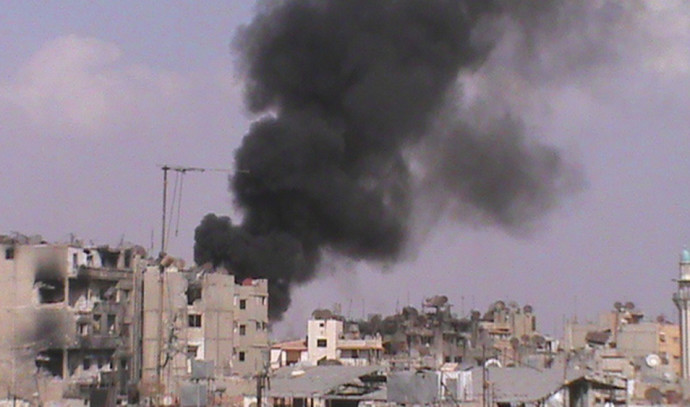
 www.jpost.com
www.jpost.com
Published: APRIL 30, 2023 22:11
Airstrikes were reported in Syria’s Homs governorate in the early morning hours of Saturday, and they come at an important juncture in the region; Jordan is hosting the Syrian regime this week and Iranian President Ibrahim Raisi is scheduled to travel to Damascus. Other reports indicated that Saudi Arabia may be interested in using its newfound ties with Iran to discuss issues with Hezbollah, either directly or indirectly, about the future president of Lebanon. As well, Iranian Foreign Minister Hossein Amir-Abdollahian recently visited Lebanon.
Syria is an important player today because it intersects with major tectonic changes in the region, changes that relate to diplomatic developments. Syrian officials recently met with Turkish, Russian and Iranian officials in Moscow, which means that some countries see Syria as a diplomatic option. Airstrikes, then, as a move, are different from diplomacy – because Damascus still enables Iran to traffic weapons to Hezbollah through Syria.
Regional media did not miss the airstrikes. Pro-Syria regime media Al-Mayadeen reported that three were wounded in the strikes due to a fire that started in a fuel tank.
The Alma Research and Education Center, which covers security issues in Israel’s northern borders, put out several posts on social media about the airstrikes. One tweet noted that “An airstrike was carried out in the area of Al Dabaa airport (southwest of Homs) and in the area of Shinshar (south of Homs).” It added that “in the past week, the activity of a medium-sized Iranian Antonov 74 cargo plane belonging to the YasAir airline was detected several times, apparently flying to and from Dabaa airport. In this airfield, there is Shia axis and Hezbollah activity.” It also notes that Shinshar contains warehouses and hangars; the town is near a Syrian air defense base.
“At this point,” the tweet continues, “we do not have recent photographs of Dabaa or the industrial area and it is not clear where exactly the attack was carried out. It is possible that the purpose of the attack is related to the arrival of the Iranian plane last week, the storage of the cargo it brought with it and the shutdown of the airfield (hitting its routes).”
KAN Arab Affairs reporter Roi Kais noted in a tweet that “the target of tonight’s attack in Syria was a convoy of trucks that passed through the continental route and contained ammunition for Hezbollah.” He added that “the people involved in it, as in previous cases, are the familiar figures – Hajj Fadi, head of Hezbollah’s Unit 4,400, Behnam Shahriyari, head of Unit 190 in the Quds Force and Sayed Razi head The Iranian aid bureau.”
A 2019 report from Israel Hayom noted that Fadi is “a senior official in Hezbollah, someone who has the ear of both Damascus and Tehran. He is responsible for smuggling weapons and money for the radical axis, using a corridor that stretches from Tehran to Lebanon, via Syria. Qasir, who lives in the shadows, is better known as Fadi, and is a key player in the Hezbollah machine. Although he is not a combatant, his position has made him a dominant figure in the organization and – as his presence in Tehran indicates – outside Hezbollah, as well.”
Of the three, it is not clear who Razi is. He could be the man identified as Razi Musavi, who was noted in a 2019 Critical Threats piece as a man who is a key conduit for Iranian support for Hezbollah, based in Damascus.
The latest airstrikes – which pro-Iran media alleges Israel was behind – are yet another example of how Iran destabilizes Syria by moving weapons through the country to Hezbollah. It undermines any attempt to reduce Iran’s octopus-like entrenchment there.

Iran-Hezbollah network in Syria and the aftermath of Homs airstrikes
Syria is an important player today because it intersects with major tectonic changes in the region, changes that relate to diplomatic developments.
Iran-Hezbollah network in Syria and the aftermath of Homs airstrikes - analysis
Syria is an important player today because it intersects with major tectonic changes in the region, changes that relate to diplomatic developments.
By SETH J. FRANTZMANPublished: APRIL 30, 2023 22:11
Airstrikes were reported in Syria’s Homs governorate in the early morning hours of Saturday, and they come at an important juncture in the region; Jordan is hosting the Syrian regime this week and Iranian President Ibrahim Raisi is scheduled to travel to Damascus. Other reports indicated that Saudi Arabia may be interested in using its newfound ties with Iran to discuss issues with Hezbollah, either directly or indirectly, about the future president of Lebanon. As well, Iranian Foreign Minister Hossein Amir-Abdollahian recently visited Lebanon.
Syria is an important player today because it intersects with major tectonic changes in the region, changes that relate to diplomatic developments. Syrian officials recently met with Turkish, Russian and Iranian officials in Moscow, which means that some countries see Syria as a diplomatic option. Airstrikes, then, as a move, are different from diplomacy – because Damascus still enables Iran to traffic weapons to Hezbollah through Syria.
Regional media did not miss the airstrikes. Pro-Syria regime media Al-Mayadeen reported that three were wounded in the strikes due to a fire that started in a fuel tank.
The Alma Research and Education Center, which covers security issues in Israel’s northern borders, put out several posts on social media about the airstrikes. One tweet noted that “An airstrike was carried out in the area of Al Dabaa airport (southwest of Homs) and in the area of Shinshar (south of Homs).” It added that “in the past week, the activity of a medium-sized Iranian Antonov 74 cargo plane belonging to the YasAir airline was detected several times, apparently flying to and from Dabaa airport. In this airfield, there is Shia axis and Hezbollah activity.” It also notes that Shinshar contains warehouses and hangars; the town is near a Syrian air defense base.
“At this point,” the tweet continues, “we do not have recent photographs of Dabaa or the industrial area and it is not clear where exactly the attack was carried out. It is possible that the purpose of the attack is related to the arrival of the Iranian plane last week, the storage of the cargo it brought with it and the shutdown of the airfield (hitting its routes).”
The Syria-Lebanon border
The research continues, noting that the area is near Qusayr – in Syria but on the Lebanese border. Hezbollah moved into this area in 2012, a year after the Syrian Civil War began. Iran shifted weapons deliveries to Hezbollah via northern Syria, using the cover of earthquake aid to funnel deliveries to Aleppo over the past several months, while online sleuths have geolocated areas where the airstrikes took place.KAN Arab Affairs reporter Roi Kais noted in a tweet that “the target of tonight’s attack in Syria was a convoy of trucks that passed through the continental route and contained ammunition for Hezbollah.” He added that “the people involved in it, as in previous cases, are the familiar figures – Hajj Fadi, head of Hezbollah’s Unit 4,400, Behnam Shahriyari, head of Unit 190 in the Quds Force and Sayed Razi head The Iranian aid bureau.”
A 2019 report from Israel Hayom noted that Fadi is “a senior official in Hezbollah, someone who has the ear of both Damascus and Tehran. He is responsible for smuggling weapons and money for the radical axis, using a corridor that stretches from Tehran to Lebanon, via Syria. Qasir, who lives in the shadows, is better known as Fadi, and is a key player in the Hezbollah machine. Although he is not a combatant, his position has made him a dominant figure in the organization and – as his presence in Tehran indicates – outside Hezbollah, as well.”
2022 US sanctions
In May 2022, the US sanctioned one of these men: “The US Department of the Treasury’s Office of Foreign Assets Control (OFAC) is designating an international oil smuggling and money laundering network led by Islamic Revolutionary Guard Corps-Quds Force (IRGC-QF) officials that has facilitated the sale of hundreds of millions of dollars’ worth of Iranian oil for both the IRGC-QF and Hezballah. This oil smuggling network, led by US-designated IRGC-QF official Behnam Shahriyari.”Of the three, it is not clear who Razi is. He could be the man identified as Razi Musavi, who was noted in a 2019 Critical Threats piece as a man who is a key conduit for Iranian support for Hezbollah, based in Damascus.
The latest airstrikes – which pro-Iran media alleges Israel was behind – are yet another example of how Iran destabilizes Syria by moving weapons through the country to Hezbollah. It undermines any attempt to reduce Iran’s octopus-like entrenchment there.

